Difficulties in trying to speed UK Afghan withdrawal
- Published
- comments

Afghan forces are heavily reliant on Nato's helicopters and medical facilities
The desire of Britain's government to speed its withdrawal from Afghanistan is being tempered by requests from commanders to maintain their current strength until the end of the 2013 summer "fighting season".
This debate has mirrored the wider one in the US about whether the pace of withdrawal could go faster still.
Philip Hammond, the UK defence secretary, said recently "it will now be possible to have a significant reduction in force numbers by the end of next year".
However, the key point here is that calls from within Prime Minister David Cameron's Cabinet for these reductions, thought to be around 4,000 of the 9,000 British troops that will be in Afghanistan next summer, to be implemented even faster have not been answered - so far at least.
Lieutenant General Adrian Bradshaw, the British deputy commander of the Nato forces in Afghanistan, confirmed on Wednesday, "the drawdown will happen after next summer's fighting season".
The campaign has followed a rhythm in which insurgent activity tends to slacken by autumn, picking up again in March or April, following the harvest of opium poppies.
Medical evacuations
Given the general public's pessimism about the Afghan mission, revealed in polls, and its expense, the government is keen to cut back. It is estimated that the campaign there will have cost £20bn by 2014. At current force levels it is running at about £2.5bn a year.
The British force will drop by 500 troops this winter. But deeper cuts cannot be made quickly without exposing the limited capabilities of Afghanistan's own forces.
Military arguments against a more rapid drawdown have centred on the Afghan's inability to perform many operational tasks for themselves. Attempts to organise helicopter squadrons or bomb disposal units capable of dealing with Improvised Explosive Devices (IEDs) have been underway for a few years, but these capabilities are still inadequate.
One crucial area of dependence on Nato is casualty evacuation. Afghans are currently serviced by Nato's bespoke system of helicopter transfer to state of the art trauma facilities such as the hospital at Camp Bastion.
Lt Gen Bradshaw says that a basic Afghan national casualty evacuation system is meant to be operating "by early 2013". However it is hard to see the Afghan forces standing up anything similar to Nato's world class emergency medical facilities in the next few years.
US military 'enablers'
Nato forces will continue the pattern of the last year in reducing their participation in combat operations - a trend that has already played its part in a 40% drop in casualties over the past 12 months - but will find it harder to cut off air, intelligence, and logistic support.
In May this year the Americans and Afghans signed a security agreement that will involve thousands of US service men and women remaining beyond the 2014 deadline. These will include "enablers" making up the shortcomings in Afghan capabilities as well as some special operations forces.
Will the UK strike a similar deal? So far it has committed only to providing some support for future officer training. Could intelligence support or special forces be added to this? Certainly many in Whitehall assume there will be some kind of on-going role in these areas. However that will depend on the British and Afghan governments.
When British combat forces withdrew from Iraq in 2009, diplomats were shocked when they realised that the government in Baghdad did not want any enduring UK training mission to remain. The government of Nouri al-Maliki could not wait to see the back of the Brits.
In the case of Afghanistan there is less hostility on the part of the host government; the real question is whether the UK has the appetite to remain in any significant numbers beyond 2014.